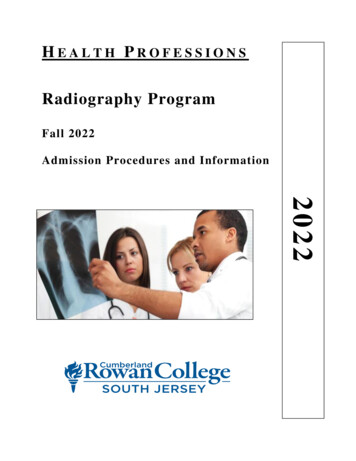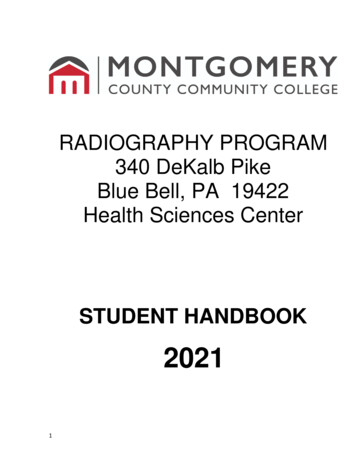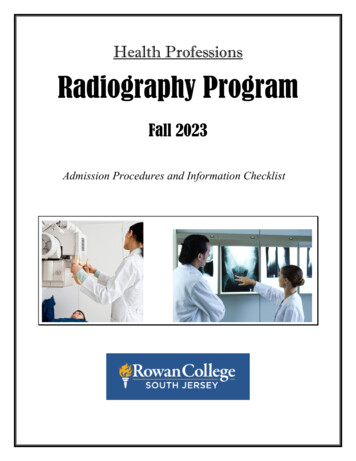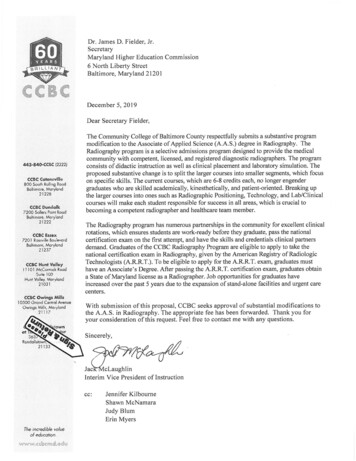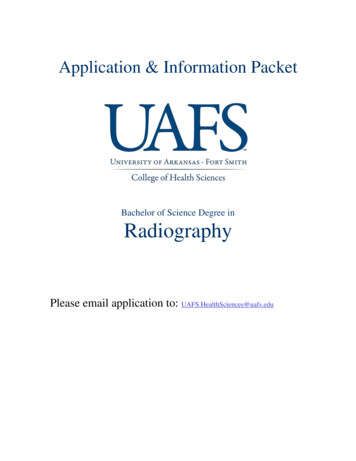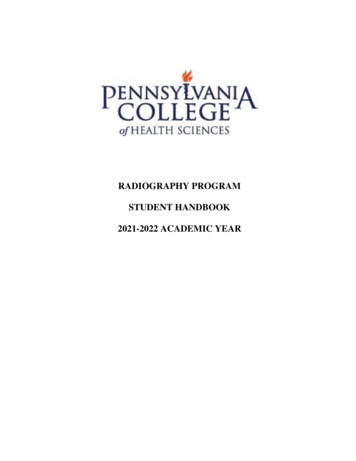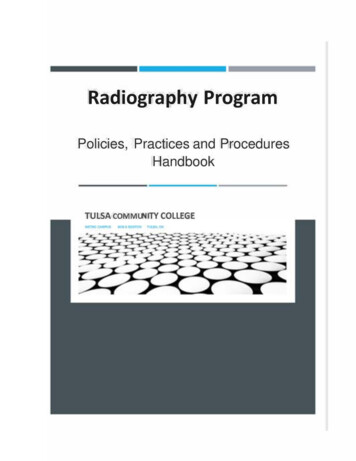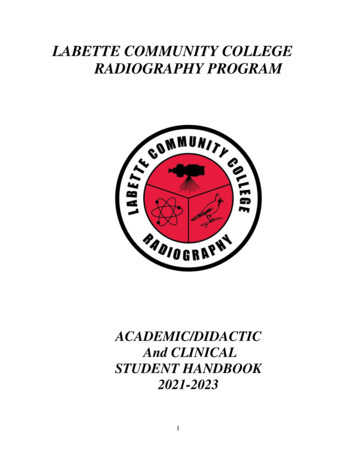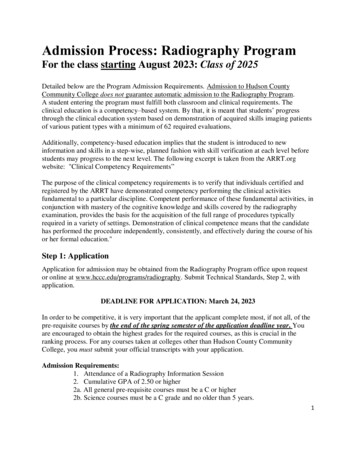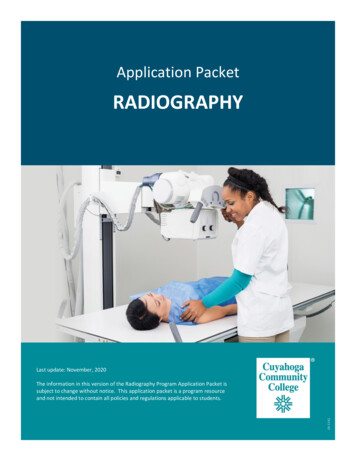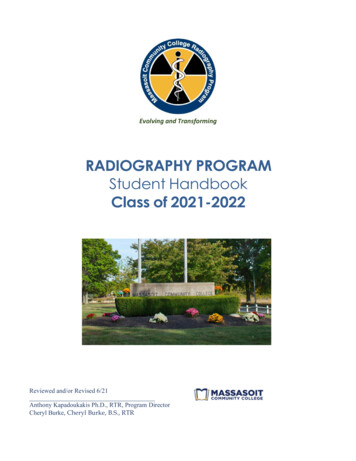
Transcription
Evolving and TransformingRADIOGRAPHY PROGRAMStudent HandbookClass of 2021-2022Reviewed and/or Revised 6/21Anthony Kapadoukakis Ph.D., RTR, Program DirectorCheryl Burke, Cheryl Burke, B.S., RTR
NON-DISCRIMINATION POLICYAffirmative Action, Equal Opportunity, and Sexual HarassmentMassasoit Community College prohibits discriminatory harassment and sexual harassment, includingsexual violence. Inquiries or complaints concerning discrimination, harassment, retaliation, or sexualviolence shall be referred to the Chief Diversity Officer & Title IX Coordinator, Yolanda Dennis, Officeof Diversity and Inclusion, 508-588-9100, x1309, Brockton Campus, Administration Building, Room219, ydennis@massasoit.mass.edu, or the Associate Dean of Students & Deputy Title IX Coordinator, JoeDiMaria, 508-588-9100, x1417, Brockton Campus, Student Center Building, Room208, jdimaria@massasoit.mass.edu. A complaint can also be filed online at www.massasoit.edu/report.For more information about Title IX, visit www.massasoit.edu/title-ix.THE FAMILY EDUCATION RIGHTS AND PRIVACY ACT STUDENT ACCESS TO /student-records-FERPA/indexThe Family Education Rights and Privacy Act (FERPA) provide the student with a right to privacy andaccess to his/her school records. The Radiologic Technology Program will comply with this Act.Access to student records is carefully controlled to maintain confidentiality. Students may view recordsheld by the Program Director during posted office hours in H 337. Students wishing to view their recordsmay do so by requesting access from the Program Director. Clinical records held by clinical instructorsmay be viewed at a mutually agreed on time. MCC transcript records may be viewed in cooperation withthe Office of the Registrar. College health and CORI records are confidentially maintained by theDivision Dean of Nursing and Allied Health.Members of the site visitation team of the Joint Review Committee on Education in RadiologicTechnology will have temporary access to all records only during an actual onsite visitation. This is forthe purpose of accreditation only. Student records will not be shown to anyone or mailed to any otherinstitution without the written consent of the student.DISABILITY SERVICES AND ACCOMMODATIONSAccess & Disability Resources (ADR) is committed to ensuring that students with disabilities have equal,effective, and meaningful access to all academic programs, community events, goods, and servicesprovided by the college in compliance with the Americans with Disabilities Act and Section 504 of theRehabilitation Act. Students with disabilities interested in establishing eligibility for services and/oracademic accommodations will need to voluntarily disclose their disability to ADR (a confidentialprocess), submit qualifying documentation and complete an Intake meeting to determineaccommodations. Once accommodations are determined, the student will need to inform their professor oftheir accommodations by providing the professor with a copy of an Accommodation Letter (provided byADR) for the current semester. Students can contact ADR at 508-588-9100 X 1807 or by e-mail atadr@massasoit.mass.edu or visit https://massasoit.edu/academics/disability/ for further information.PREGNANCYNotification must be made in writing to the program directorFemale students who become pregnant or suspect pregnancy are encouraged by the National Council onRadiation Protection and Measurements (NCRP) to notify ‘declare’ the Program Director orInstructor immediately! Notification must be made in writing. A student also has the right to ‘undeclare’her pregnancy at any time. Notification must be made in writing to the program director. Once a studenthas undeclared her pregnancy in which case, the student will be treated as though she were not pregnant.This is in accordance with Federal and State laws. Confidentiality is assured if necessary.1
TABLE OF CONTENTSUp to date information refer to the Massasoit Community College website RadiographyNon-Discrimination Policy, Family Education Rights and Privacy Act (Availability ofRecords), Disability Statement, Pregnancy DeclarationWelcome and Program OfficialsRadiologic Technology Organizational ChartMassasoit Community College AdministrationProgram Mission Statement, Goals , and Program EffectivenessProgram PhilosophyPractical StandardsCode of EthicsExplanation of HandbookIntroductionMassasoit’s Guidelines of CivilityProfessional BehaviorsClinical Education Centers and InstructorsJCERT/AccreditationNational / State RegistryProfessional SocietiesProgram OverviewAcademic/Graduation RequirementsDegree Evaluation/Directions for Degree Evaluation, Intent to GraduateClinical Warning, Failure of Radiology Course, ReadmissionReadmission, Unscheduled Leave and Death in Family LeaveMilitary Leave, Make upGrade Policy/Grade Appeal ProcessDisciplinary Action/Grievances – Academic and Clinical DismissalStudent Grievance ProcedureStudent Services-Advisement & Counseling, DisabilitiesPathways to SuccessLibrary Services, Academic Resource Center, Veterans, Financial AidAlcohol and Drug Policy, Sexual Harassment/Harassment Policy, Tuition/FeesStudent Health Physical Examination,Medical Insurance, CORI/SORI, Liability, Hepatitis BStudents Working As Radiology Aides, School RecordsConfidentiality StatementGeneral Safety RulesStandard Precautions and Goggles, Exposure Incident Management ProtocolCoronavirus Vaccination RequirementStudent Safety Policy Care and Facial Safety DevicesRecommendation to All Health Care Providers/Communicable Disease ReportingHazardous Materials Policy and Hand HygieneLatex Sensitivity and Allergy PolicyRadiation Safety/Monitoring2Page 1Page 4Page 5Page 6Page 7Page 8Page 9Page 11Page 12Page 13Page 14Page 15Page 17Page 18/19Page 20Page 21Page 22Page 23Page 24Page 25Page 26Page 26Page 27Page 28-29Page 30-31Page 32Page 34Page 35Page 36Page 37Page 37Page 38Page 39Page 40Page 41Page 42Page 43Page 44Page 45Page 46Page 47-52
Student Pregnancy PolicyProtective Measures for the Pregnant StudentDirect Vs. Indirect Supervision/Repeat PolicyRadiology Dosages/Exposure Regulatory LimitsACR MR safetyU.S. Nuclear Regulatory Commission Regulatory GuideFailure of a Radiography CourseConductStudent Practice, Policy on Clinical EmergenciesTrajecsys Reporting SystemCorrelation with InstructorsOrientation to Clinical SiteStudent Orientation to Clinical SettingConsideration for the PatientClinical Experience, Graduation from the program PoliciesAlternate Shift Policy and Clinical Transfer PoliciesClinical Shift Hours, Violation, Transfer PoliciesSocial Media Policy/Confidential InformationHIPA, Dress Code – ClinicalRepeat Radiography Policy, Clinical SupervisionEvaluation of Clinical PerformanceClinical Evaluation Process - Competency examination, Professional, BehavioralPage 53Page 54Page 55Page 56Page 57Page 57Page 58Page 59Page 60Page 61Page 62Page 63Page 64Page 65Page 66Page 67Page 68Page 69Page 70Page 71Page 72Page 73-74Clinical and General Patient Care ObjectivesClinical Grading ProcessCancellation of Classes, Clinical Attendance PolicyTransportation, Parking, Hospital VisitingOSHA, Student Clinical Records and Monitoring BadgesDidactic and Clinical Competency RequirementsImaging Procedures ARRTMCC LaboratoryAcademic Warning FormClinical Warning FormSignificant Incident Report FormWaiver for Radiology Aide Employment FormClinical Waiver FormAcknowledgement of Radiation Risk During Pregnancy FormRules for Clinical Sites FormChecklist for Prior to Performing the X-ray Exam FormConfidentiality Agreement FormStudent Handbook Acknowledgement/Agreement FormMCC Appeals ProcessAcademic CalendarCampus MapPage 75Page 76Page 78Page 79Page 80Page 81-82Page 83-85Page 86Page 87Page 88Page 89Page 90Page 91Page 92Page 93Page 94Page 95Page 96Page 97Page 98Page 99performance assessment, retention competencyIn addition, to the radiography program policies and procedures.Radiography Student Handbook replicates information from the MCC Students Handbook found ologic-technology/3
RADIOLOGICTECHNOLOGY PROGRAMEvolving and TransformingWelcomeThe Radiography Program faculty welcomes you as a new or returning student. Our goal is to provideyou with a high quality education in radiography that will prepare each of you to be a caring andcompetent radiographer in today’s high-tech health-care workplace, and we will work with you toachieve this goal.We wish you every success in your educational experience.RADIOLOGIC TECHNOLOGY PROGRAMPROGRAM OFFICIALSINTERIM DEAN OF NURSING & ALLIED HEALTHDr. Catherine Powers Ozyurt cpowersoz@massasoit.mass.eduOffice: H 336 – x1789PROGRAM DIRECTOR/DEPARTMENT CHAIRAnthony Kapadoukakis, Ph.D. R.T (R) akapadoukakis@massasoit.mass.eduOffice: H 337 - x1784CLINICAL COORDINATOR AND INSTRUCTORCheryl Burke, B.S., R.T.(R)(M)(CT) cburke6@massasoit.mass.eduOffice: H 331 - x1764TRAJECSYS WEBSITE: https://www.trajecsys.comSTUDENT CENTRAL DMINISTRATIVE ASSISTANTS NURSING & ALLIED HEALTHTheresa Willis: H333 twillis@massasoit.mass.eduKathleen O’Neil: H554 koneil9@massasoit.mass.edu4
RADIOLOGIC TECHNOLOGY ORGANIZATIONAL CHARTRADIOLOGIC TECHNOLOGY MAP: diologic-Technology.pdf5
MASSASOIT COMMUNITY COLLEGE ADMINISTRATIONPRESIDENTDr. Ray DiPasqualeOffice of the President - Massasoit Community CollegePROVOST/V.P. OF ACADEMIC AND STUDENT AFFAIRSDr. Deanna YameenINTERIM DEAN OF NURSING & ALLIED HEALTHDr. Catherine Powers OzyurtDEAN OF STUDENTSJoseph DiMariaCHIEF DIVERSITY OFFICERYolanda DennisSTUDENT DENT -life/ACADEMIC RESOURCE CENTER sources/FINANCIAL AID 6
RADIOLOGICTECHNOLOGY PROGRAMEvolving and Transforming#0380ACADEMIC YEAR 2021-2022PROGRAM MISSION STATEMENTThe Radiology Program of Massasoit Community College serves the radiologic medical community andthe population of greater Brockton, Southeastern Massachusetts, Cape Cod and the Islands by preparingcompetent entry-level radiologic technologists who are competent in the performance of radiographicexaminations, demonstrate critical thinking and problem solving skills in their practice of radiologyprocedures, communicate effectively with staff and patients, employ radiation safety practices, fosterprofessional development, growth and are prepared to achieved certification and employment in the fieldin radiologic technology.The clinical affiliations are the foundation of the program. They provide a clinical instructor to supervisethe students, staff who have an important role in the success of the student’s clinical education, and adiverse patient population. The faculty of the program is committed to promoting in its students theconcepts of professional development, ethical and moral behaviors, a high-quality work ethic,compassion, and care to culturally diverse populations.GOALS:1. Students will be clinically competent.1.1 Students will apply positioning skills.1.2 Students will select appropriate technical factors.1.3 Students will demonstrate appropriate radiation safety practice.2. Students will effectively utilize critical thinking and problem-solving skills.2.1 Students will demonstrate adaptability and flexibility when met with a new circumstance relatedto the radiographic exam, difficult cases, or variations from the routine.2.2 Students will evaluate images for diagnostic quality.3. Students will demonstrate effective oral and written communication skills.3.1 Students will use effective oral communication skills.3.2 Students will demonstrate professional decision-making.4. Students will participate in professional activities.4.1 Students will practice written communication skills.4.2 Students will participate in professional activities.PROGRAM rtment/radiologic-technology/5. Student and community needs will effectively be served by the program.5.1 Annual program completion rate of 75% or better5.2 Five-year average credentialing examination pass rate of 75% or better for first attempt5.3 Five-year average job placement rate of 75% or better7
RADIOLOGICTECHNOLOGY PROGRAMEvolving and TransformingPROGRAM PHILOSOPHYThe Radiology Program at Massasoit Community College bases its foundation on which the programfunctions by the following: The belief that a student can succeed in the program if the student employs the tools available forstudent success and program faculty supports the student. The belief that the clinical affiliates play an integral role in the program’s success. The belief that radiographers must demonstrate ethical, moral, and professional standards whenserving the population of the community and other healthcare members. The belief that the program must graduate entry-level technologists who promote professionaldevelopment to produce images of high quality. The belief that as a professional a radiographer one must be able to employ critical thinking andproblem-solving skills to render quality images, deliver compassionate patient care and judiciousexposure.PINNING CEREMONYAt the completion of the program, you are encouraged to participate in a Pinning Ceremony held in yourhonor. As part of the ceremony, students will be awarded a program pin, participate in the planning andexecution of the ceremony.It is encouraged that the first-year radiography students assist with and participate in this ceremony.8
PRACTICAL STANDARDSTechnical StandardsIndividuals admitted to Massasoit Community College’s Radiography program must possess thecapability to complete the entire curriculum. The curriculum requires demonstrated proficiency in avariety of cognitive, problem-solving, manipulative, communicative and interpersonal skills. Therefore,applicants must review the following clinical standards to determine their ability and compatibility withthe physical requirements of radiographers. If you have any questions regarding these standards or yourability to meet these standards, you should contact the Program Director at 508-588-9100, ext. 1784.Physical Activity RequirementsOccasional Crouching—positioning patients for exams and stocking supplies. Repetitive motions—entering computer data. Grasping—positioning patients for exams and procedures. Pulling—moving items that can weigh as much as 100 pounds.Frequent Pushing—transporting patients in wheelchairs or on carts using 25 pounds of force. Movingportable and C-arm equipment with 20 pounds of force to areas of the hospital. Pulling—assisting and moving patients off and onto carts using 8 to 24 pounds of force. Lifting—moving patients (who can weigh more than 50 pounds) from wheelchairs/carts off andonto exam tables. Fingering—entering computer data and setting techniques for exams. Carrying—carrying cassettes that can weigh as much as 25 pounds.Routine Stooping—positioning of exams and assisting patients in and out of wheelchairs. Reaching—positioning patients and manipulating portable equipment. Standing—all clinical assignments require standing and walking for 80% of clinical time. Walking—transporting and assisting patients into dressing/exam rooms. Walking to other areas ofthe department and hospital to do exams or have images interpreted. Talking—must be able to communicate verbally in an effective manner with patients, co-workers,and physicians. Hearing—perceiving the nature of sounds at normal range; ability to receive detailed informationthrough oral communication, and to make fine discriminations in sound, during auscultation andpercussion. Feeling—perceiving attributes of patients and objects such as when positioning patients forprocedures or palpating veins for IV insertion.Visual Acuity Requirements During clinical assignments, students are required to use a computer terminal and set the properexposure techniques on the x-ray equipment. Clinical assignments require critiquing of radiographs. Clinical assignments require working with printed and/or written documentation. Students must be able to assess patient’s condition, i.e., color, respiration, motion, etc.9
Intellectual and Emotional Requirements Students must be able to assess radiographs and determine diagnostic quality. Students must be able to make adaptations and respond with precise, quick and appropriate actionduring emergency situations. Students must maintain patient confidentiality. Students must be able to maintain a high standard of courtesy and cooperation in dealing with coworkers, patients, and visitors and satisfactory performances despite the stress of a hospital workenvironment. Students must be able to learn to analyze, synthesize, solve problems and reach evaluative judgment. Students are expected to be able to learn and perform routine radiographic procedures. In addition,students must have the mental and intellectual capacity to calculate and select proper technicalexposure factors according to the individual needs of the patent and the requirements of theprocedure’s standards of speed and accuracy. Students must be able to accept criticism and adopt appropriate modifications in their behavior. Students must demonstrate emotional health required for utilization of intellectual abilities andexercise good judgment.Clinical Situations Students are subject to electrical, radiant energy, and chemical hazards. Persons in radiology sciences have been identified as having the likelihood of occupational exposureto blood or other potentially infectious materials and, therefore, are included in the OSHA ExposureControl Plan with its specifications to prevent contact with the above materials.10
TABLE OF CONTENTSPreambleEthical professional conduct is expected of every member of the American Society of RadiologicTechnologists and every individual registered by the American Registry of Radiologic Technologists. As aguide, the ASRT and the ARRT have issued a code of ethics for their members and registrants. Byfollowing the principles embodied in this code, radiologic technologists will protect the integrity of theprofession and enhance the delivery of patient care.Adherence to the code of ethics is only one component of each radiologic technologist's obligation toadvance the values and standards of their profession. Technologists also should take advantage ofactivities that provide opportunities for personal growth while enhancing their competence as caregivers.These activities may include participating in research projects, volunteering in the community, sharingknowledge with colleagues through professional meetings and conferences, serving as an advocate for theprofession on legislative issues and participating in other professional development activities.By exhibiting high standards of ethics and pursuing professional development opportunities, radiologictechnologists will demonstrate their commitment to quality patient care.Code of Ethics1.The radiologic technologist conducts himself or herself in a professional manner, responds topatient needs and supports colleagues and associates in providing quality patient care.2.The radiologic technologist acts to advance the principal objective of the profession to provideservices to humanity with full respect for the dignity of mankind.3.The radiologic technologist delivers patient care and service unrestricted by concerns of personalattributes or the nature of the disease or illness, and without discrimination on the basis of sex, race,creed, religion or socio-economic status.4.The radiologic technologist practices technology founded upon theoretical knowledge andconcepts, uses equipment and accessories consistent with the purpose for which they were designed andemploys procedures and techniques appropriately.5.The radiologic technologist assesses situations, exercises care, discretion and judgment; assumesresponsibility for professional decisions; and acts in the best interest of the patient.6.The radiologic technologist acts as an agent through observation and communication to obtainpertinent information for the physician to aid in the diagnosis and treatment of the patient and recognizesthat interpretation and diagnosis are outside the scope of practice for the profession.7.The radiologic technologist uses equipment and accessories, employs techniques and procedures,performs services in accordance with an accepted standard of practice and demonstrates expertise inminimizing radiation exposure to the patient, self and other members of the health care.8.The radiologic technologist practices ethical conduct appropriate to the profession and protectsthe patient's right to quality radiologic technology care.9.The radiologic technologist respects confidences entrusted in the course of professional practicerespects the patient's right to privacy and reveals confidential information only as required by law or toprotect the welfare of the individual or the community.10. The radiologic technologist continually strives to improve knowledge and skills by participatingin continuing education and professional activities, sharing knowledge with colleagues and investigatingnew aspects of professional practice.11
RADIOLOGIC TECHNOLOGY PROGRAMThis Rad handbook is prepared for use by students enrolled in the Associate of Science in RadiologicTechnology Program and contains information specific to Radiologic Technology education at theMassasoit Community College.For general MCC policies, see the MCC Student Handbook, https://massasoit.edu/academics/studenthandbook/ and the MCC Catalog, e information contained within this handbook is not intended to be wholly independent, but instead, acomplement to the MCC Catalog as well as the MCC Student Policy Manual maintained and published bythe Massasoit Community College.The information in this handbook is current at the time it is printed. However, policies, guidelines andprocedures are subject to change.Final interpretation of the program policies and procedures will be made by the program’s faculty.This handbook contains extremely important information relating to the curriculum of RadiologicTechnology at Massasoit Community College. It is your responsibility to become familiar with thecontents of this handbook.Always refer to the most current online volume of the Handbook, MCC Catalog, and the MCC StudentHandbook.Radiologic Technology Department FacultyAnthony Kapadoukakis Ph.D., RTR, Program DirectorCheryl Burke, B.S., RTR, Clinical CoordinatorReviewed: 3/202112
RADIOLOGICTECHNOLOGY PROGRAMEvolving and TransformingINTRODUCTIONWelcome to the Massasoit Community College Radiologic Technology Program!Welcome to Massasoit Community College’s radiography program. We’re pleased to have you in theprogram and feel that you have selected a very exciting and rewarding career. To make the next twoyears as uncomplicated as possible, we have designed this handbook to be a quick reference concerningyour responsibilities as a radiography student.As a student of Massasoit Community College, you are expected to observe all rules and regulations ofthe college. These can be found in the MCC Student Handbook and the college catalog, both can be foundon the Massasoit Community College website, massasoit.mass.edu. Please take some time to review them.Rules, regulations, policies and procedures set forth in this handbook must be followed while on thecollege campus and at the clinical sites. All clinical sites are considered to be an extension of the collegewhile students are present. Please be aware that these policies and procedures are designed to ensure thesafety of both our students and patients, as well as to adhere to JRCERT Standards.The signing of the last page of this handbook represents a contractual agreement between MCC and theradiography student from the time of first class attendance. Failure to comply with the rules andregulations may affect student evaluations, grades and could lead to dismissal from the radiographyprogram.This handbook may not be the source of all needed information; but, it should answer many of thequestions that may arise on a daily basis. Since the radiography program is continually evolving andimproving, the radiography faculty reserves the right to make changes without prior notice in all policies,faculty assignments, time schedules, course assignments, courses, grading, curricula and all othermatters contained in this handbook. When changes occur, the students and clinical instructors willpromptly be given updated replacement pages or a new issue of the handbook and/or verbally advised.If at any time the student has a question or concern that cannot be resolved through the use of thishandbook, he or she should not hesitate to contact a MCC radiography program faculty member. We arehere to assist you in reaching your highest potential and career goals.We hope this handbook will acquaint you with the Radiologic Technology program and provide you withan understanding of our policies. This handbook should help you realize what is expected of you as astudent in a health care profession. Not every eventuality can be foreseen, therefore, areas not covered inthis handbook will be dealt with on an individual basis.13
MASSASOITS GUIDELINES OF CIVILITYBy virtue of your being accepted as a student at Massasoit Community College,YOU are now part of our learning community.Be courteous and respectful to everyone.Treat others the way you want to be treated.Respect this campus.Put trash in its proper place. Leave places better than you found them.Come to class on time and do not leave early.If you know in advance you must leave class early, inform the professor and sit near an exit.Attend class, pay attention, and be prepared.Sleeping, reading the newspaper, doing work for another class are unacceptable.Do not talk while the professor or other classmates are speaking.It’s rude and disruptive to everyone in the class.Turn off all electronic devices – cell phones, pagers, beepers, IPODs, MP3 players – in classrooms,labs, and library. No text messaging while in class. No Audio or Video recording of ClassesIf you foresee extenuating situations, inform your professor ahead of time and set devices so as to beunobtrusive.Refrain from using profanity and degrading language.On a college campus, the words we use set the tone.Smoke only in designated areas.Look for no smoking signs and smoking receptacles.Refrain from yelling in corridors, cafeteria, student lounge, and quadrangle.We all need to create a learning environment where students can study and learn.Be responsible.Take ownership for your actions and choices.How we conduct ourselves has an impact on others. Let’s make it a positive one!Reviewed May 201914
PROFESSIONAL BEHAVIORS1. Students must respect the confidentiality of their PATIENTS, fellow STUDENTS, andFACULTY. The student is required to respect the dignity, individuality, privacy and personalityof each and every individual. Information about a patient should be shared on a “need to know”basis only, and not for reasons of a personal interest. In other words, in order to provide services,it is necessary for various professional personnel to know personal information about a patient. Ifa patient’s information is discussed related to official class business (e.g., during class), thepatient’s identity must remain anonymous; and information about the patient that is not necessaryto the learning situation must not be shared, (e.g., identify of known relative, legal or moral issuesnot related to RAD services being rendered). This is also true about personal discussions thatstudents participated in during class time. Students are expected to respect the confidentiality andprivacy of your classmates. Health Insurance Portability and Accountability Act (HIPAA)guidelines must be adhered to at all times.2. Class and clinical attendance is required. Students are expected to provide advance notice ofabsences or a reasonable explanation to the faculty member whose class is missed as soon aspossible (and not later than 24 hours) after the missed class. Clinical absences require notificationprior to the start of the shift to the clinical supervisor and the clinical coordinator of theradiography program. In case of serious illness, or other emergencies, the student will need todirectly inform his/her instructor via personal e-mail or phone. If the faculty member is notavailable, the student will need to leave a message. Missed clinical time may be required to bemade-up. In the event of serious illness or emergency, the student and instructor will develop awritten plan for making up missed clinical time.3. E-Mail Requirements. Upon registration in the program, each student is assigned an e-mailaccount through MCC. Students will be required to use their e-mail accounts for registrationpurposes, and to receive messages from the Radiography Program. Students are expected to checktheir e-mail at least daily.4. In Class/Clinical Computer Use: Courses may require the use of computers for classroom andclinical activities. When electronic devices are used in class or clinical, it is expected to be forschool classroom activities only. Any student using an electronic device for non-school relatedactivities will be excused from the class or clinic. Students failing to comply with this policy willbe reported to the Dean’s office for appropriate disciplinary action and may be subject to dismissalfrom the program.5. Student purchase of textbooks is required. Each semester, students are provided with a bo
The Radiography Program faculty welcomes you as a new or returning student. Our goal is to provide you with a high quality education in radiography that will prepare each of you to be a caring and competent radiographer in today's high-tech health-care workplace, and we will work with you to achieve this goal.
